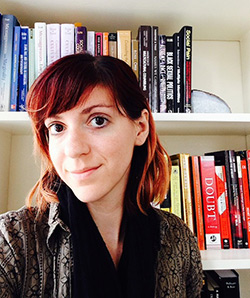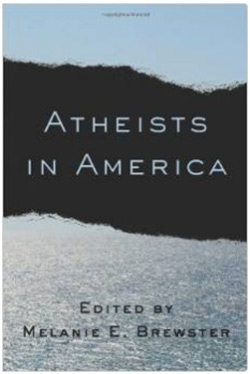Beyond Belief: In Melanie Brewster's new book, atheists speak in their own voices
In
a new book by TC’s Melanie Brewster, atheists speak in their own voices
Note: Brewster will deliver a book talk on Atheists in American on Wednesday, September 17th, from 4- 5:30 in
Russell 306 in TC's Gottesman Libraries. Stephen Mills and another
contributor, Camilo Ortiz, a clinical psychologist at Long Island
University, will be on hand.
When the poet Stephen Mills told his parents he was gay, they took it with surprising equanimity. “There were tears, of course, and then my mother admitted she thought I was going to say I was an atheist.”
Mills’ recollection, published this past spring in Melanie Brewster’s Atheists in America, (Columbia University Press), says it as clearly as anything: in the United States, Godlessness is the ultimate taboo and nonbelievers are among the most marginalized of all minorities. If that seems surprising in a country known for tolerating all kinds, consider that:
- America is the most religious of all developed nations.
- 84 percent of those surveyed in a 2006 Gallup poll said the country isn’t ready for an atheist president.
- Only three openly declared atheists have served in Congress during the past 125 years.
- Through constitutional amendments, seven states prohibit atheists from holding public office. Arkansas prohibits atheists from testifying as witnesses in court trials.
- Survey data consistently finds that among historically oppressed minorities, atheists are regarded as “more troubling” than Jewish, Muslim, African-American and LGBTQ people.
Brewster, Assistant Professor of Psychology and Education, is best known for her work on gender, sexuality and race, but her broader interest is in the psychological impact of identifying as a minority of any kind.
“The prejudice and social stress associated with openly being atheist may pose a serious threat to an individual’s well-being,” she writes. “Therefore, the hesitancy to include people who identify as atheist in the broader multicultural and social justice discourse is puzzling and disturbing.”
Brewster takes a major step toward addressing that omission, simply by rendering the voices of atheists themselves. Her book is a collection of 27 essays, solicited by Brewster via open call on the internet, by non-believers from across the country. In the plainspoken honesty of its contributors, and in the breadth of American life it represents, Atheists in America is reminiscent of Studs Terkel’s Working and Becky Thompson’s more recent Names We Call Home, on race, which Brewster cites as a model.
The authors include:
Lynette, a Midwesterner who grew up going to Bible school, until she decided, “I was sick of being valued less as a woman because of God’s mysterious ways.” That realization was followed by an “Aha” moment when “it just suddenly made sense that the Bible was the way it was because it was written by men, men that had their own flaws and prejudices.”
James Mouritsen, a Utahan who provides a Mormon “Quick Start Guide” for divine inspiration that includes having a “Sincere Heart,” and then warns, “If problem persists, it is likely that ‘Sincere Heart’ is corrupt.”
Adrienne Filargo Fagan, who, in a piece titled “Born Secular,” writes that, with “no Pearly Gates… we have one opportunity to make the right decisions for ourselves, our families, and our communities. This knowledge is what gives meaning to my life.”
And perhaps most moving of all, the elderly Elizabeth Malm Clemens, displaced by Hurricane Katrina from her lifelong home in New Orleans and now caring for a husband sinking into dementia. “I am attempting to work with residential administrators to develop better options for the aged in their last decade of life,” she writes in a piece titled “A Contrarian Life.” “Having lost faith in earlier refrains that provided unworthy, I choose this one to end my time on this fascinating planet.”
Brewster, who grew up in Miami and attended graduate school in Northern Florida and Salt Lake City, declines to delve into her own personal history in the book, other than a dedication to her parents thanking them for “their undying love, even when I officially went over to the dark side.” But she does contribute a fascinating essay on the demographics and politics of American atheism itself. The 9/11 terrorist attacks helped give rise to the stridently anti-religious New Atheists, led by firebrands such as Richard Dawkins, Sam Harris and the late Christopher Hitchens. Yet other perspectives, such as African American humanist thought, hold that women and minorities may feel excluded from atheism precisely because its most visible faces are white men.
Yet perhaps younger writers like Brewster herself are paving
the way for broader acceptance of all under the atheist banner. At a book
signing during Book Expo America at New York City’s Javits Center, Brewster was
approached by an elderly Muslim man.
“He handed me a Koran to keep. Then he smiled nervously and said, ‘I hope that was okay.’” – Joe Levine
Published Wednesday, Sep. 3, 2014

